PyroManiac devotes Monday space to esoteric and offbeat things, in the hope that these will supply learning experiences for us all.Song of Deliverance
Herb and Ruth Clingen |
Herb and Ruth Clingen were career missionaries who retired in Southern California and spent the final years of their lives ministering alongside John MacArthur to the people of Grace Community Church.
During World War II, the Clingens were held prisoner in a civilian internment camp in Los Banõs, not far from Manila in the Philippines. It was a long and grueling ordeal.
Near the end of the war, as part of General MacArthur's successful campaign to liberate the Philippines from Japanese domination, the internees at Los Banõs were dramatically rescued in a dawn raid by American paratroopers. It was one of the most remarkable and heroic chapters of World War II history, but the raid on Los Banõs was neither well publicized nor widely noticed, even at the time, because it happened on the same day as the battle of Iwo Jima, and that event got all the headlines.
Still, a number of WWII history books include chapters on Los Banõs—
some from the perspective of the rescuers, and
a few from the perspective of the internees.
The story of the picture-perfect rescue is well worth tracking down to read in detail. It would make a wonderful movie.

Herb's diary |
Herb Clingen kept a diary of his experiences during the war. The handmade diary in which Herb recorded the story of their imprisonment and rescue was a burlap-bound, hand-embroidered notebook—a gift from Ruth to Herb on their first Christmas in the Japanese prison. (It's one of the "books" referred to in Herb's first diary entry below.) The worn diary remained one of his most precious possessions until the end of his life.
Herb and Ruth wanted to write a detailed account of their internment and deliverance, but they were never able to interest a publisher in publishing it. In the late 1980s, they enlisted my help in compiling a single chapter of annotated notes from Herb's diary for publication in a magazine. Herb's diary entries are italicized in brown below. The black text is the commentary Ruth added in about 1988.
Herb and Ruth are both with the Lord now. I wish Herb could have lived long enough to see what an impact the Internet has had. A blog would have been an ideal medium for the serialization and publication of his wartime diary.
So today, in honor of Herb and Ruth, I'm including the article they asked me to help them write. The heart of this article consists of excerpts of Herb's diary. The diary portions are presented as they were written, despite the pejorative use of the word "Japs." That was a common expression during the war, and I have retained it here rather than compromising the integrity of Herb's diary.
I hope you'll enjoy this sample of Herb and Ruth's war experiences. It's a moving account of God's faithfulness in our severest trials.
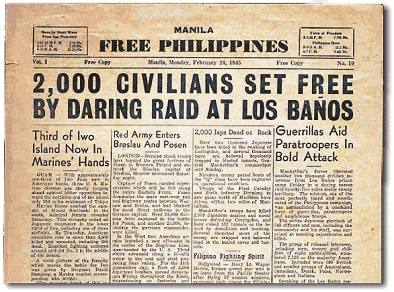
We had seen American planes flying low overhead. The Allies were finally winning the war in the Pacific. But what was wonderful news to most Americans had ominous overtones for us. Together with our three-year-old son Bobby we were prisoners of the Japanese along with more than 2,000 other civilian internees in the Philippines.Rescue from Los Banõsby Herb and Ruth Clingen
Monday December 25, 1944—Christmas was a happy, happy day. Happiness, as with other such joys is a comparative thing. This year, in our own "little home" with our own little boy, we celebrated our Savior's birth. What a thrill to see Bobby react to his first Christmas of which he will have a memory! The little toys I made (Mickey Mouse, blocks, cigar-box cart) and the lovely books and clothes Ruth made were joyously received.Our "little home" that Christmas was a makeshift set of bamboo barracks at Los Banõs. It was one of the largest internment camps of World War II, located about an hour south of Manila, at the Philippine National School of Agriculture.
Herb's journal entry the next day was more somber.
Tuesday December 26—Christmas Day has passed, and with it our last can of meat and any supply of food. There is a temptation to despair as we see this war continue perhaps to find us here well into 1945. Also, rumors are abroad that our rations will receive a still further cut. (Mush this morning was as low as it has been for some time.)
As our boys come nearer (saw five P-38s today—two, in fact, right over camp) the Japs get harder to deal with. What will be our plight? That a crisis is impending, no one doubts. So much for Hebrews 13:5-6. As for Romans 15:30-32, it is a challenge to pray that we will get out of here.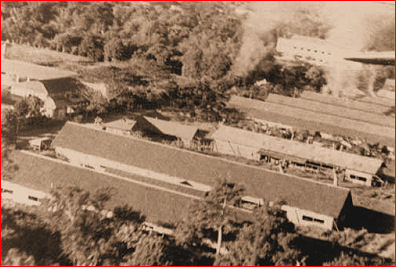
Los Banõs internment camp from the air as liberation begins. Note smoke from markers for paratroopers. |
We did not know it, but our captors expected American soldiers to attempt a rescue at any time. The camp guards were prepared for a wholesale massacre. They had positioned large drums of gasoline throughout the barracks. If American soldiers tried to rescue us, the gasoline would be set ablaze. Prisoners running out of the barracks amid flames and confusion would be met with machine-gun fire.
The Japanese were notorious for atrocities against prisoners of war. The Bataan death march led to nearly 50,000 deaths of captured American soldiers by starvation, torture, and disease.
Worse, at the POW camp on Palawan, Japanese guards, mistakenly thinking they were going to be attacked, had forced 140 prisoners into underground shelters, doused them with gasoline, and set them ablaze. Los Banõs was set for a similar holocaust, only this time with civilians—including hundreds of women and children.
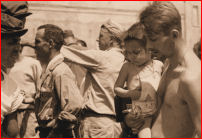
Civilian prisoners |
What a night! Bobby contracted a bit of a cold. When he can't breathe properly I defy anyone to get a sound sleep! This besides mosquitos that got into his net made the night a nightmare. But morning found us in good spirits although we have had to keep him in. His high fever is gone and at time of writing he is snoring peacefully!Thursday December 28—Bobby has had a cough and cold since Christmas but is better. He has ever so much fun with his toys. A darling child and is taking it on the chin as cheerfully as his mummy. Thank God for both of them.Nearly everyone in the camp was suffering from beriberi and other side-effects of severe malnutrition. Daily food rations consisted of two meals a day, usually nothing more than a meager cup of mush and on good days mongo beans. Meat was almost unheard of, and many of the prisoners ate pods from unidentified trees to supplement their diets.
We ached for Bobby. Once a friendly Japanese guard had given him an extra portion of rice. Several weeks later, Bobby saw another guard washing dishes at a spigot. When he approached and asked the man for some rice, the guard gruffly brushed him off. Bobby, crushed, ran to Herb crying bitterly. There was nothing Herb could do. It broke our hearts.
Weighing even more heavily on Herb's mind was the fact that I was seven months pregnant. If we weren't rescued soon, the baby would face certain malnutrition. We tried to be optimistic.
Monday January 1, 1945—And what a happy New Year this is going to be. Everyone is confident that before many weeks (perhaps days) we are going to be out of here! Today some 24 to 26 4-motor bombers flew over—so white and new they looked—escorted by a large number of P-38s! As they passed over they fired what some folks interpreted to be the victory code " . . .—." Morse code V for victory!
Friday January 5—O, Like Hudson Taylor, may these experiences prepare us for a life of rich ministry in years ahead. It will be worth it!!A week into the new year, we were awakened very early one morning by commotion in the camp.
Sunday January 7 (4:15 A.M.)—We are FREE!!! Praise God! Jap guards have pulled out. Chairman has signed a receipt for us all. Have been advised to remain within confines of camp until . . .!!!
Double mush, coffee, coconut mush for breakfast at 8:50 A.M. Everyone beside himself with joy!!! The beginning of a new day! A new chapter opens for our lives. May it all be for Him, whose I am and whom I serve!We could not leave the camp because we were still behind Japanese lines. But we were now confident that it was only a matter of time before American soldiers showed up to liberate us completely. In our euphoria, someone suggested a new name for the camp.
Camp Freedom, Los Banõs—Just back from flag raising ceremonies. We have been declared free! What a shout of cheer went up!Prisoners immediately raided the guards' barracks and storehouses. There they found supplies—including rice, vegetables, and food like we had not seen for months!
Tuesday January 9—Bobby received MILK!!! A quart bottle of pasteurized milk from animal husbandry. I tasted a bit. DELICIOUS! Bobby went after it like a little calf! First fresh cow's milk he has ever had. Imagine—we didn't use any mush from the line this noon! And three days ago we went to bed starved—literally! How good God has been to us.The camp committee had warned us to stay within the camp for our own safety, but few prisoners were able to resist the urge to stand outside the barbed wire fence and just smell the air of freedom.
Wednesday January 10—Went outside gate by old Italian camp. Stood on bridge. A foretaste of what it will be like to be free! Glorious!!! Had more molasses mush and cocomash.But our freedom was to be short-lived. At the end of the week we were awakened in the middle of the night with chilling news.
Saturday January 13—"The Commandant Konishi and his staff have returned. Keep away from the fence and all sentry boxes . . ." With this announcement we were awakened. Our hearts melted like water and the rest of the night gave us fitful sleep. Apparently the Japs have been hard pressed. They looked worn and haggard, Konishi not having shaved since he left.
Would like to write impressions and reactions of past week. Afraid I can't express them. Had thought in passing that the Japs might take camp over again (small garrison remained at front gate after 1st day) but never dreamed old commandant and staff would return.Konishi was a brutal, ruthless man—surely the most hated and feared man in our camp. He swaggered around the camp with a slight limp, intimidating the prisoners and his own soldiers with threats and acts of cruelty. We assumed from the way our captors looked that they had been called to the front lines to dig trenches for the combat soldiers. Their reappearance at our camp was completely unexpected. I still get a sinking feeling remembering that day. It was one of the bleakest we have ever known.
Roll call lasted from 2 P.M. till 3:30. Nothing is in orderly manner. No one respects the Japs and they have lost so much face they don't seem to respect themselves. Some are of the opinion they will leave in a short while. However, they have restricted us to camp under penalty of death.Konishi was furious that the internees had raided the storehouses. He demanded the immediate return of everything that had been taken. He was especially indignant that his radio was missing. Apparently someone had taken it into the village and bartered for food with it, because it was never returned. Konishi's response was to cut our already meager food ration. From that day on, he seemed determined to inflict as much agony on us as possible.
Monday January 15—Mass demonstrations! Protests! Meetings—visits with Konishi, staff, etc. What a day!
Shortly after breakfast it became evident that we were to have no noon meal and only mush and stew for supper. Women of one of the barracks went to Konishi and demanded we have food. He called them all kinds of names, threatened them and tore around in general. But camp refuses to go back on pre-starvation rations since we know food is available outside the camp.The showdown only made Konishi more vicious. From that time on his treatment of internees was sadistic.
Tuesday January 16—Two boys from upper camp were caught up a tree. Taken by guards with bayonets to Konishi's office. Shortly after several shots heard.Konishi's plan had been to torment the camp into thinking he was going to torture the young boys over a minor infraction. The gunshots were an unplanned part of the drama.
Just got news shooting was by guards. Internee caught going over fence and was shot. Brought dead to hospital. Serious days. Dangerous.Konishi had threatened the death penalty for anyone caught outside the camp. A young internee named Pat Hell had sneaked out to look for food. He was gunned down immediately by the camp guards. He was not to be Konishi's last victim.
Friday January 19—Konishi has been as mean as the devil again. Promises if things returned that had been taken after they left he would consider food again. Ruth not well. Situation is wearing on her nerves. The days are long and we have waited a lifetime. "Thou art my hiding place; Thou shall preserve me from trouble: thou shalt compass me about with songs of deliverance" (Psalm 32:7).
Sunday January 21—Six years ago today we left America! Three years ago today we first hid out in the mountains. What does the future hold for us? It holds eternal life, we know! Hallelujah!Three years of captivity had worn us down. The terror and violence of the past week were pushing us to the breaking point. Then came an incident that showed us just how merciless our captors could be.
Sunday January 28—Awakened this morning by rifle shot. An internee, George Lewis, was shot reentering camp.George Lewis had sneaked out of camp to try to find food. The guards saw him returning and shot him in the shoulder. The wound was not serious, but Konishi refused to let the camp doctor treat him. They dragged him behind a building and shot him through the head, literally blowing his brains out. The entire camp was stunned. We realized, perhaps for the first time, just how savage our captors could be when they were desperate.
We were desperate, too. Konishi continued to cut the food ration. He seemed intent on starving the entire camp to death. It was as if he wanted to punish us for America's victories against Japan.
Tuesday January 30—At lunch today darling Ruth stated that something would have to change soon as she just cannot seem to get this mush down any longer. She has been a remarkable example of patience and endurance.
Wednesday January 31—Konishi cut grain ration again—25 grams corn, 215 grams rice—lowest it has been. Thank God for our rice on hand. Made thick stew of pig weed & 300 Grams rice this noon.
Thursday February 1—Committee had meeting with Konishi. Starting tomorrow we are to be reduced to a little less than 200 grams of corn/rice per person. Committee to protest this drastic cut. Everyone discouraged because our boys still 20-30 miles from Manila and our situation here getting steadily worse. I find comfort in Psalms 27 & 46.
Sunday February 4—While in church Ruth and I looked up on hill at any number of banana and coconut trees—fruit for which we are starving. O lord, how much longer? Ruth is weakness personified. She can hardly get around. How my heart goes out to her. Please Lord, grant that she may get some strengthening food before the baby comes.Food was available—for a price. Somehow a black market continued to operate underground within the camp. If one had money, or jewelry, or almost any valuables, he could supplement the food ration with illegally obtained food. But the prices were exorbitant—about $50 for two pounds of rice.
Monday February 5—Ruth and I are discussing trading her diamond engagement ring for food. I see that our food is sufficient to sustain life but not enough to build strength. Thus, for Ruth's sake I would consider a trade for mongo beans and sugar. If nothing happens by the 15th, we must do something drastic.
Wednesday February 7—Ruth has not been strong today but God has given grace. Something must happen before the 19th because the camp's grain issue runs out then. God will not forsake us.A few days later the Committee voted to give a supplementary ration to expectant mothers. It eased the pressure enough so that we decided not to trade my ring, but we continued to starve.
Thursday February 8—I had a season of prayer beside Bobby's bed at which time I reconsidered just what my devotion to Christ really means. Not only a yielding of myself as a living sacrifice but also the surrendering of Ruth and Bobby. No one knows what will be the end of this thing. May my life be a positive testimony of God's ability to keep one's mind at peace in the midst of suffering, hunger, weakness, and wasting.News about the war raging all around us was scarce. We heard bombs and tremendous explosions—often frighteningly close to camp, but we did not know what the noises meant. One thing was clear: both sides were suffering heavy casualties as the fighting dragged on.
Tuesday February 13—American Filipino Scouts came into camp, reporting that our forces lost heavily in Manila but finally broke through. Santo Thomas is free. People in deplorable condition. Supposedly relief is coming here from the south. Remains to be seen.Santo Thomas was another civilian internee camp in Manila. We had been held there before being moved to Los Banõs.
Friday February 16—A meeting with the Japs reveals that they have obtained little rice. Only a few kilos of any kind of vegetables are coming in. The trees in the compound are fast being cut down for firewood. The situation is desperate. One kilo of rice now sells for $70 US. Another internee died of beriberi yesterday. God is a refuge for us (Psalm 62:5-8).
Saturday, February 17—Didn't sleep well last night. Babies cried and thought of food situation worried me, I confess, in spite of wonderful prayer service at Landis's last night. Guess I fear the starvation suffering—not so much for myself as for Ruth and Bobby. I got down beside Bobby's bed and sought God's face. He answered and I immediately went to sleep and had sweet dreams.But Konishi found an inventive way to abuse us even more. He increased the food ration but gave us
palay—unhusked rice. Eating the rice with its razor-sharp outer shell would cause intestinal bleeding that would kill us in hours. We had no tools to remove the husks, and doing the job manually—by pounding the grain or rolling it with a heavy stick—consumed more calories than the rice would make up for. It was the death sentence for all internees.
Monday February 19—This morning Konishi handed over rice issue: 8 sacks of husked rice and 36 25-kilo sacks of palay! Whiteman in explaining his situation and offering materials in exchange for food. He claims he and family will go over fence! It just cannot be long! Dr. Magill passed to a rich reward 4 A.M.Dr. Magill was 68. He had died of malnutrition.
Wednesday February 21—The situation at present: one death per day for the last six or seven days. These caused by malnutrition resulting in beriberi. Our only hope is God. Never before have I been so thrown upon the Lord. It won't be long now. It will be over the fence or over the River. The prayer of my heart is that I shall not fail Him. "Be anxious for nothing" (Philippians 4:6). "Though He slay me yet will I trust Him."Hours after Herb wrote that in his diary, we awoke to another day of desperate hunger. I remember the sense of dread and despondency as Herb prepared boiling water for "breakfast."
Saturday February 24—A brief resume of yesterday: Got fire under pot by 6:45 A.M. Too cold for shower. Roll call bell just rung when heard noise of many planes. Went to look. Paratroopers! Excitement. Shots. Under bed with Ruth and Bobby. Saw Jap steal down beside barracks. Moments later paratroopers swarmed camp. Entire garrison of 85 Jap guards wiped out. Konishi included! Soon tanks came into camp via all roads. Order given to evacuate barracks.General MacArthur's Army had finally come. The 511th Parachute Infantry's 1st Battalion came en masse from the sky at exactly 7:00 A.M. That was the exact time our guards had their morning calisthenics, during which they locked their weapons in a cabinet across the field. Guerrillas and a few ground-based troops broke into the camp, seized the weapons cabinet, and routed the entire guard force. Many were killed. Most—including Konishi as we learned later, fled for their lives into the surrounding jungle.
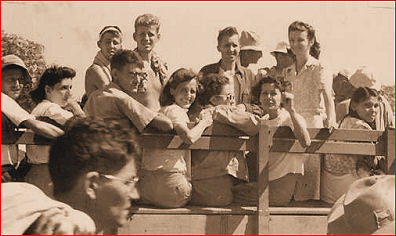
Some of the prisoners prepare for the trip to freedom. |
The American soldiers rounded up the stunned prisoners with what few possessions we had left. Miraculously, not a single internee was seriously wounded in the raid. They loaded us into amphibious vehicles—which we had never seen—and took us safely across the lake to Manila.
Into tanks safely. Soldiers gave us biscuits, fruit bars. Started out toward beaches and returned fire as were challenged. A 20th century miracle—tanks became ferries and took us across Laguna de Bay to Manila! Thrilling! Arrived here about 5 P.M. Standing in noon chow line at Bilibid prison outside Manila as I write. This will be our home for the next few days at least. Ruth fine. In hospital ward with Bobby for rest.
Have since learned what our fate would have been. Retreating Japs had artillery trained on our camp. They were to have exterminated us sometime during the day (according to reports) but God answered prayer and we were delivered JUST IN TIME! We are all safe and happy. Praise God!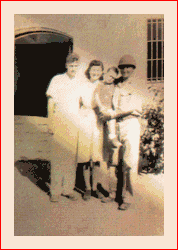
Herb, Ruth, and Bobby with one of their rescuers |
And so we were saved from a certain death. Exactly a week later I delivered a daughter, Betty. We had been rescued in time for me to gain some strength before her birth, and she was fine and healthy. The doctor had no scales, but he optimistically estimated her weight at 6 lbs. She and Bobby both grew normally with no adverse effects from our ordeal.
Looking back we see the hand of God clearly protecting us through three years of captivity. In the midst of our worst starvation, just days before we were rescued, Herb wrote in his diary, "
O, Like Hudson Taylor, may these experiences prepare us for a life of rich ministry in years ahead. It will be worth it!!"It has been worth it. We constantly are asked to share our experiences during the war, and literally hundreds of people have turned to the Lord because of the testimony of His faithfulness to us.
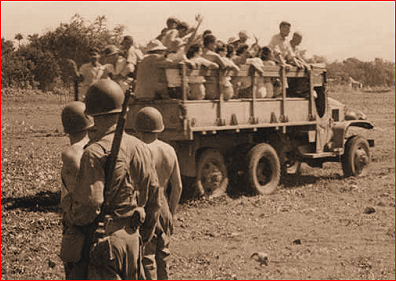
Free at last! |
Years after the war we learned that Konishi had been found working as a grounds keeper at a Manila golf course. He was put on trial for his war crimes and hanged. Before his execution he professed conversion to Christianity, saying he had been deeply affected by the testimony of the Christian missionaries he had persecuted.
Herb and Ruth Clingen
See also:

 .
. Here's an excerpt one of the last sermons Spurgeon ever preached at the Metropolitan Tabernacle. This was preached on April 19, 1891—less than a year before Spurgeon's death. Spurgeon was embroiled in a great theological conflict at the time. It was the height of the "Down-Grade Controversy."
Here's an excerpt one of the last sermons Spurgeon ever preached at the Metropolitan Tabernacle. This was preached on April 19, 1891—less than a year before Spurgeon's death. Spurgeon was embroiled in a great theological conflict at the time. It was the height of the "Down-Grade Controversy." .
.


 Last week I was asked to give a group of college students a 50-minute survey of the history of Calvinist opinion. Sound like I bit off more than I could chew? That's what I think, too. But if you want to listen to
Last week I was asked to give a group of college students a 50-minute survey of the history of Calvinist opinion. Sound like I bit off more than I could chew? That's what I think, too. But if you want to listen to 

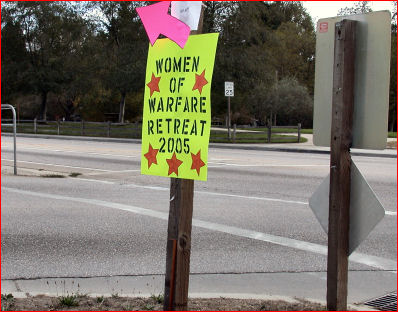

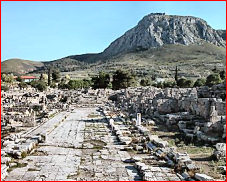

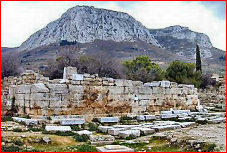
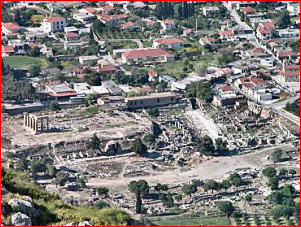
 A couple of Brit-bloggers,
A couple of Brit-bloggers, 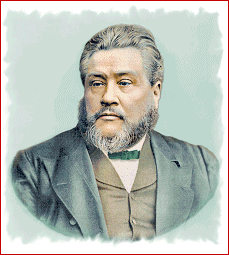 These are the new men whom God has sent down from heaven, to tell us that the apostle Paul was all wrong, that our faith is vain, that we have been quite mistaken, that there was no need for propitiating blood to wash away our sins; that the fact was, our sins needed discipline, but penal vengeance and righteous wrath are quite out of the question. When I thus speak, I am free to confess that such ideas are not boldly taught by a certain individual whose volume excites these remarks, but as he puffs the books of gross perverters of the truth, I am compelled to believe that he endorses such theology.
These are the new men whom God has sent down from heaven, to tell us that the apostle Paul was all wrong, that our faith is vain, that we have been quite mistaken, that there was no need for propitiating blood to wash away our sins; that the fact was, our sins needed discipline, but penal vengeance and righteous wrath are quite out of the question. When I thus speak, I am free to confess that such ideas are not boldly taught by a certain individual whose volume excites these remarks, but as he puffs the books of gross perverters of the truth, I am compelled to believe that he endorses such theology.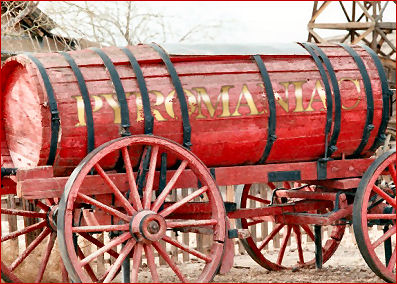
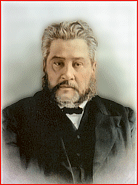 from
from  It should be clear by now that I oppose strict pacifism in principle.
It should be clear by now that I oppose strict pacifism in principle. On the other hand, I can't think of a single instance in which it would be appropriate for the church or her leaders to bear a sword or use violent means of any kind as part of their ministry. Although Christian life and ministry are often portrayed in Scripture as warfare, it's not a war against flesh and blood (Ephesians 6:12).
On the other hand, I can't think of a single instance in which it would be appropriate for the church or her leaders to bear a sword or use violent means of any kind as part of their ministry. Although Christian life and ministry are often portrayed in Scripture as warfare, it's not a war against flesh and blood (Ephesians 6:12).
 When the recent pacifism thread got interrupted by my brief hiatus, I received a smattering of e-mail from angry pacifists. Their usually non-agressive tranquility was greatly disturbed by my suggestion that some forms of killing may actually be authorized by God—and therefore are righteous acts.
When the recent pacifism thread got interrupted by my brief hiatus, I received a smattering of e-mail from angry pacifists. Their usually non-agressive tranquility was greatly disturbed by my suggestion that some forms of killing may actually be authorized by God—and therefore are righteous acts.




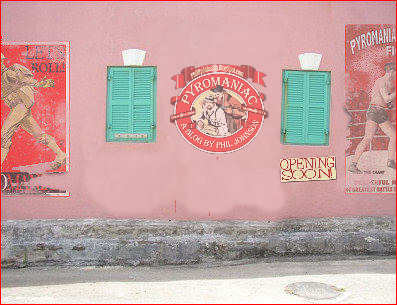
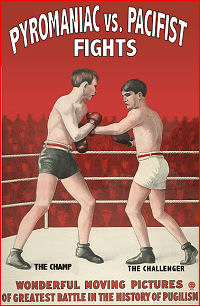 Christians who embrace radical pacifism face a serious dilemma when they come to the Old Testament, because the historical narratives of the Hebrew Scriptures are filled with instances when the Lord commanded the Israelites to go to war.
Christians who embrace radical pacifism face a serious dilemma when they come to the Old Testament, because the historical narratives of the Hebrew Scriptures are filled with instances when the Lord commanded the Israelites to go to war. Apparently, I still need to explain what I was saying about Mr. bin Laden.
Apparently, I still need to explain what I was saying about Mr. bin Laden. OK, here's the deal...
OK, here's the deal...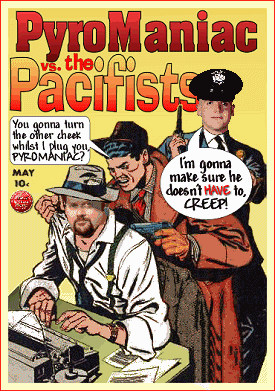 Here's an admission that will come as no surprise to those who know me: I'm not a pacifist. In fact, I think radical pacifism is both immoral and unbiblical.
Here's an admission that will come as no surprise to those who know me: I'm not a pacifist. In fact, I think radical pacifism is both immoral and unbiblical.






